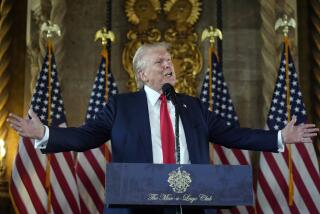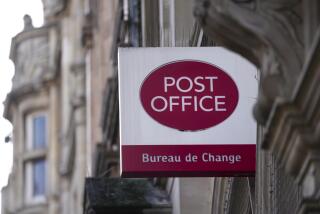Ruling would dismiss corruption convictions at Azusa company
- Share via
A federal judge in Los Angeles has issued a tentative ruling that would dismiss the corruption convictions of executives at an Azusa power transmission equipment maker because of misconduct by prosecutors.
In May, a federal jury convicted Lindsey Manufacturing Co., its president, Keith Lindsey, and vice president, Steve K. Lee, of violating the Foreign Corrupt Practices Act, which makes it a crime for U.S. firms to bribe foreign government officials.
The case centered around allegations that the company and executives paid a salesman in Mexico to bribe an official in that country’s state-owned electricity utility. The bribes were intended to encourage the Mexican utility to buy Lindsey-made emergency electricity towers, prosecutors said.
But defense attorneys asked U.S. District Judge A. Howard Matz to dismiss the convictions because of “intentional government misconduct,” accusing FBI agents of making false statements in testimony to a grand jury and in a request for a search warrant.
Justice Department prosecutors were aware the testimony was false and did not correct it, defense attorney Jan L. Handzlik argued in the dismissal motion.
Handzlik said Lindsey was thrilled by the judge’s ruling, which he described as an extraordinary blow to government lawyers.
“It happens, but it’s very, very unusual,” he said.
A government attorney acknowledged that the prosecution had made some missteps during the case.
“We regret those mistakes,” Justice Department attorney Jeffrey Goldberg told Matz at a hearing Tuesday, according to Bloomberg News. “We strive to get it right every time, and in this case we didn’t get it right every time.”
Defense lawyers had argued that the case should be dismissed because the prosecution’s misconduct hampered the defendants’ rights to a fair trial. They accused prosecutors of failing to provide them with transcripts of the FBI agents’ false testimony to a grand jury until the trial had started, making it difficult for them to raise the issue at trial.
The potential dismissal would be particularly difficult for the Justice Department because officials had promoted the Lindsey case as an example of how important it is for the United States to enforce its foreign corruption law.
Aaron Murphy, a partner at Latham and Watkins in Los Angeles who wrote a handbook about the U.S. Foreign Corrupt Practices Act, said the violations were blatant.
“The government has an obligation to produce these transcripts, and they didn’t do it,” he said. “It’s not too much to expect that when the Justice Department brings the hammer down on someone that they have to play by the rules.
“So the decision to not do it makes you look bad. It is an embarrassment. I mean, how many federal dollars were expended on this prosecution that are now wasted?”
Matz’s tentative ruling would dismiss the case with prejudice, meaning prosecutors would not be permitted to seek a second trial. Their only option would be to appeal Matz’s ruling.
Thom Mrozek, a spokesman for the U.S. attorney’s office in Los Angeles, declined to comment Wednesday.
“We are awaiting the court’s final ruling. We will review when it is finalized,” Mrozek said.
More to Read
Inside the business of entertainment
The Wide Shot brings you news, analysis and insights on everything from streaming wars to production — and what it all means for the future.
You may occasionally receive promotional content from the Los Angeles Times.










